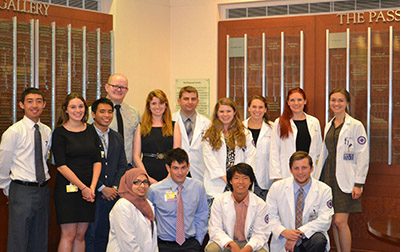
During the 2014 Comprehensive Transplant Center Summer Student Immersion Program, Blake Platt, a second-year medical student, developed a methodology to evaluate the complications of living liver donors after donation.
Over the course of the 10-week program, Platt worked with his mentors Daniela Ladner, MD, associate professor of Surgery, Division of Organ Transplantation, and Donna Woods, PhD, associate research professor, Center for Healthcare Studies, to write a evidence-based dictionary, or codebook, of complications, to enhance an existing evaluation process called the Institute for Healthcare Improvement (IHI) Global trigger tool, that identifies adverse events. The team reviewed medical records to find complications that were likely to occur, found definitions of the complications and categorized them.
“We might see a patient has hypertension, and they have it because of 1, 2 or 3. So later, when we look at a medical record we know why things happened and why this person has hypertension,” he said. “We found this method to be more work-intensive, but it is better to have sensitive and specific data so we know exactly what we are looking at, rather than having a quicker way of looking at less data.”
Platt, one of 29 Feinberg medical students to go through the immersion program, said he thought it was an excellent way to learn about medicine and continues to work on the research project as part of the AOSC (Area of Scholarly Concentration) program for Northwestern medical students.
“The internship gave me a lot of insight into transplant as a whole and being immersed in that environment is one of the best ways to learn about the specialty,” he said.
Sponsored by the Northwestern University Transplant Outcomes Research Collaborative (NUTORC) and the Northwestern University Collaborative in Transplant-Related Immunology and Biomedical Engineering (NUCTRIBE), the immersion program offers students of various educational backgrounds the opportunity to learn about transplant research and study areas such as health services outcomes, bioengineering and immunology. Program participants also join weekly clinical ward rounds, attend lectures and observe surgeries and clinic visits.
Since the program’s inception in 2011, a total of 71 students have participated, including high school, undergraduate, graduate and medical students from across the country. They have co-authored 12 manuscripts and 109 abstracts at national meetings.
Katy Secunda, ’14 MD, now a resident in Internal Medicine, participated in the program as a medical student and learned how to develop a project from the beginning and take it through to publication (Liver Transplantation, 2013).
“As a first year medical student, I had little background in clinical research and even less understanding of what it took to develop and execute a research project from start to finish,” Dr. Secunda said. “I wanted to gain experience in hypothesis generation, project design and data analysis, and the summer immersion program allowed me to do that.”
Her project examined the process of liver transplant candidate selection. While progress has been made toward creating selection criteria based on objective measures of disease severity, there are still many medical and psychosocial patient characteristics that can influence decision-making when selecting candidates, Dr. Secunda explained.
With her mentor Josh Levitsky, MD, associate professor in Medicine-Gastroenterology and Hepatology and Surgery-Organ Transplantation, in collaboration with social scientist Elisa Gordon, PhD, associate research professor at the Center for Healthcare Studies, she developed a web-based survey that assessed the opinions of transplant providers across the US on a patient’s suitability for transplantation based on eight characteristics: age, psychiatric diagnoses, body mass index, incarceration status, marijuana use, HIV positivity, cognitive disability and citizenship/residency status. They found that reasons to withhold transplant varied with provider type, center volume and geographical region, and less than half of the providers reported that their centers had policies regarding most of the characteristics examined.
“Variability in opinions is important because it suggests inequity in the patient selection process across different providers, center sizes, and geographic regions,” Dr. Secunda said.
The experience not only enhanced her medical education, but also impacted her graduate medical education: she plans to get involved with research during her second year of residency.
“I think having some background in clinical research has prepared me to be involved in more research during my residency,” she said.






